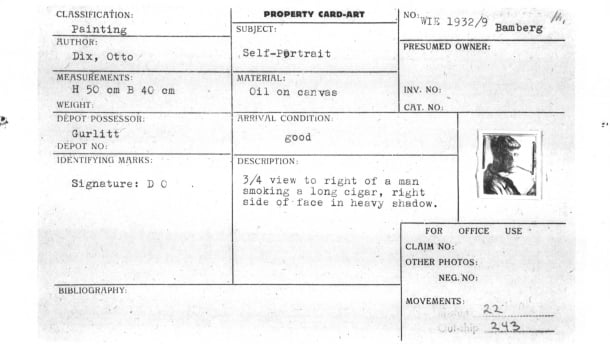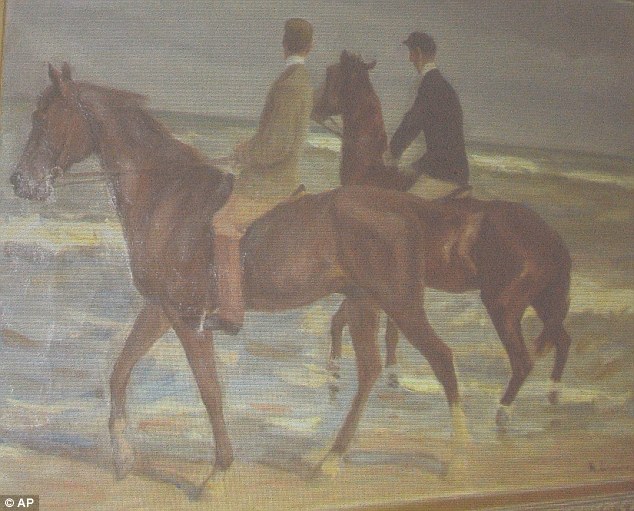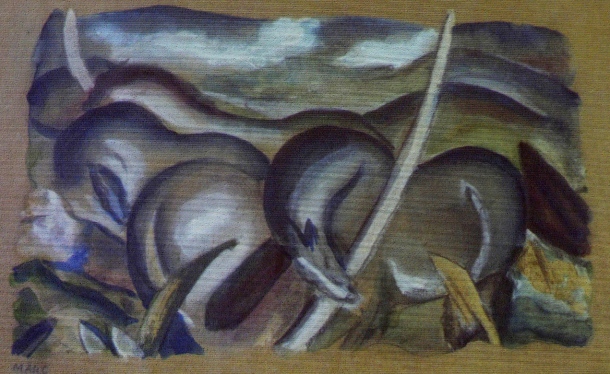Late Tuesday evening—the day after Memorial Day no less—the United States Office of the Solicitor General filed a brief amicus curiae in our clients’ pending case against the Federal Republic of Germany and the Stiftung Preussischer Kulturbesitz for restitution of the Guelph Treasure (in German, the Welfenschatz). This brief was in response to the Supreme Court’s invitation in January that the SG file a brief expressing the views of the United States. In an unprecedented abdication of 80 years of leadership redressing Nazi-looted art, the Solicitor General argued that there is no circumstance in which a Nazi-forced sale victimizing a German Jew in the 1930s could constitute a violation of international law such the Foreign Sovereign Immunities Act would confer jurisdiction over either Germany or the SPK. The U.S. government has taken the position that only property claims against non-Germans suffice—even though, of course, the U.S. government has acknowledged in every relevant context since the early 1940s that Jews ceased to be full members of German society on the day Hitler assumed power: January 30, 1933. This is an historic disgrace. Germany has rightly been shamed for minimizing in court over the last five years the genocidal character of its persecution against Jews, but for the United States to do so the day after we rightly honored the hundreds of thousands of Americans who died to defeat Nazi Germany is appalling.
U.S. Solicitor General’s Office Advocates Broad Impunity for Nazi Art Thefts
Topics: Monuments Men, Foreign Sovereign Immunities Act, Washington Conference on Holocaust Era Assets, Supreme Court, Holocaust Victims Redress Act, Stiftung Preussischer Kulturbesitz, Hermann Goering, FSIA, Monuments Fine Arts and Archives Program, Washington Principles, Federal Republic of Germany, Welfenschatz, Military Government Law 59, Holocaust Expropriated Art Recovery Act, HEAR Act, Wannsee Conference, D.C. Circuit, Military Government Law No. 59, london declaration
RESCHEDULED Event: "Looted Art for Sale" at Brandeis University November 6, 2018
I am honored to be one of the presenters at an upcoming symposium at Brandeis University entitled "Looted Art for Sale" that was postponed last winter. This interdisciplinary conference will provide an international perspective on the last twenty years of art recovery. Speakers include former Ambassador Stuart Eizenstat, a primary leader in the creation of U. S. restitution policies, Kim Oosterlink, Victoria Reed, and Inge Reist.
"Looted Art for Sale" will be sponsored by the Brandeis Center for German and European Studies, the Rosenberg Institute of Global Finance at Brandeis International Business School, the Mandel Center for the Humanities and the Department of Fine Arts.
My presentation will be entitled “Who Makes the Rules? The High-Stakes Legal Conflicts Over Looted Art.” I can scarcely claim to belong among such excellent company, so if for their perspectives if not for mine, I encourage anyone interested to attend. Registration is available here.
Topics: Monuments Men, Nazi-looted art, A Tragic Fate, Inge Reist, Stuart Eizenstat, US-Iran Relations, Kim Oosterlink, Carol Clark, Nancy Scott
Heirs of Nazi-Persecuted Art Dealer Alfred Flechtheim Sue Bavarian Museums
Paintings by Beckmann, Gris and Klee Valued at Nearly $20 Million That Once Belonged to Flechtheim Are at Issue in New York Lawsuit
Sullivan & Worcester LLP has filed suit against Bavaria and its state museums in U.S. District Court in Manhattan on behalf of our clients Dr. Michael Hulton and Mrs. Penny Hulton, heirs to the renowned and persecuted Jewish art dealer Alfred Flechtheim. The Hultons have asked the United States District Court for the Southern District of New York to restitute several paintings by Max Beckmann, Paul Klee, and Juan Gris that are now in the possession of the German federal state of Bavaria, Adolf Hitler’s and the Nazi party’s homeland, and its Bavarian State Paintings Collections (known in German as the Bayerische Staatsgemäldesammlungen, or BSGS). We are aided in this case by our co-counsel Markus Stoetzel and Mel Urbach, Esq.
Topics: Frankfurter Allgemeine Zeitung, Cornelius Gurlitt, Deutschlandradio. Deutsche Presse Agentur, Monuments Men, Nazi-looted art, Foreign Sovereign Immunities Act, Max Beckmann, Markus Stoetzel, Mel Urbach, Paul Klee, FSIA, Gurlitt, NS Raubkunst, Restitution, Bavaria, Sullivan & Worcester LLP, World War II, Alfred Flechteim, Bayerische Staatsgemäldesammlungen, Dr. Michael Hulton, Juan Gris, George Grosz
Another Bombshell in Munich—Bavarian Government Sold Looted Art to Nazi Families
Works returned by Monuments Men to Bavaria for restitution to victims instead sold to Nazis’ families
Journalists Catrin Lorch Jörg Häntzschel published this weekend an explosive revelation in Sueddeutsche Zeitung entitled “the Munich Looted Art Bazaar,” reporting on the work of the Commission for Looted Art in Europe (CLAE): the government of Bavaria sold artworks returned to it after World War II by the famed Monuments Men that were supposed to be restituted to the victims of Nazi looting. Not only was the art given back to the German state on the explicit condition that it be restituted to the victims of Nazi art plunder, in some cases it was literally returned to the families of Nazi officials, such as Emmy Goering (Hermann’s daughter) and Henriette von Schirach rather than to the victims themselves. Less than a month after the Federal Republic of Germany’s toxic and revisionist reply brief in the Welfenschatz case (which argued, among other things, that individual claimants cannot sue because the U.S. policy was this national level restitution), the ramifications are far reaching for Germany’s self-professed adherence to the Washington Conference Principles on Nazi Looted Art of 1998. While the specific artwork in question may be less significant than most of the works found in Cornelius Gurlitt’s apartment four years ago, the revelation is in many ways much, much worse. The CLAE scholarship that lead to this schocking development cannot be praised enough.
Topics: Monuments Men, Nazi-looted art, Munich, Gurlitt, NS Raubkunst, Restitution, World War II
Secret Witness Contradicted Hildebrand Gurlitt’s Claim to Monuments Men that His Art was Burned in Dresden
From Dresden to Aschbach to Düsseldorf—New Scholarship in U.S. Archives Traces Hildebrand Gurlitt at War’s End, Could Affect Cornelius Gurlitt’s Claim to Good Faith Ownership
The Main Post has an article today (in German) by Christine Jeske tracing the late-war and post-war trajectory of Hildebrand Gurlitt and his now-infamous collection. The article is fascinating, and sheds considerable light on how the collection came through the war and how Gurlitt evaded greater scrutiny that might have revealed the trove’s whereabouts earlier. It also puts into context any claim Cornelius Gurlitt might now have to argue he took possession of the paintings from his father unaware of their provenance—what will be a critical argument, particularly if yesterday’s Cultural Property Restitution Law proposal by Bavaria becomes federal law in German.
Topics: Wiesbaden, Cultural Property Restitution Law, veschollene Kunst, Franken, Franconia, Hildebrand Gurlitt, Cornelius Gurlitt, George Clooney, Erik Berger, Augsburg, Dresden, Nuremberg, Fall Gurlitt, Monuments Men, Gurlitt Collection, Karl Haberstock, Kunstverein, Entartete Kunst, Munich, Heiner Dikreiter, Beutekunst, Freiherr Gerhard von Pölnitz, Bavaria, Kulturgut-Rückgewähr-Gesetz, Nürnberg, Düsseldorf, Schlüsselfeld, Monuments Fine Arts and Archives, Gemäldegalerie Dresden, Christine Jeske, Walter Paech, degenerate art, Städtische Galerie, München, Main Post, Karl and Magdalene Haberstock Foundation, Raubkunst, Verjährung, Nazi Raubkunst, Aschbach
German Museums Join in Demands for More Information About Gurlitt; Links to the Amber Room Theorized; Dix Painting Was Not Unknown
Der Spiegel reports today (link in German) about how German museums are joining the chorus of frustration about the lack of information about the Hildebrand and Cornelius Gurlitt collection find. From this perspective, this development is not a surprise. I was speaking to an international law class last night at Sarah Lawrence College, and one of the students asked me what the reaction in Germany would be. My feeling was that sooner rather than later, the German museum community, and likely the federal government, will push for a forward-looking solution. Present-day Germany takes questions about the Holocaust quite seriously, and for this collection to have turned up in Germany is sparking an embarrassment that could lead to more decisive action. The problem right now seems to be that everyone is waiting for someone else to make the first move.
Topics: Jeu de Paume, unbekannte Meisterwerke, February 13 1945, FAZ, Focus, Hildebrand Gurlitt, Dresden firebombing, Max Fisher, Cornelius Gurlitt, S. Lane Faison, Linz Führermuseum, Munich Central Collecting Point, Monopol, Wiesbaden Collecting Point, Dresden, HARP, Reinhard Nemetz, Max Liebermann, WWII, Monuments Men, Gurlitt Collection, Max Beckmann, Otto Dix, Degenerate Art: The Fate of the Avant-Garde in Naz, Auktionshaus Lempertz, Entartete Kunst, Fine Arts and Archives Program, Nazis, Marc Chagall, Organisation Todt, Paul Klee, Entdeckung verschollener Kunst, beschlagnahmte Bilder, Dresdner Bank, Belvedere, Fritz Todt, Holocaust Art Project, Hamburg Kunstverein, MFAA, Roberts Commission, Angela Merkel, Restitution, Wien, Monuments Fine Arts and Archives, Selbstporträt, World War II, degenerate art, Erben, Raubkunst-Bildern, Portrait of Wally, Washi, Löwenbändiger, Austria, Franz Marc, Oskar Kokoschka, Washington Principles, Ernst Ludwig Kirchner, München, Pablo Picasso, Dr. Herman Voss, Museums, Kristallnacht, Riders on the Beach, Hans Posse, Nazi Raubkunst, Vienna, Alfred Weidinger, Henri Matisse, Self Portrait, Emil Nolde
Focus Turns to Hildebrand Gurlitt’s Postwar Interrogation; Cornelius Gurlitt’s Whereabouts. Belvedere Official Questions Whether Collection Was Really a Secret
Topics: Jeu de Paume, unbekannte Meisterwerke, February 13 1945, FAZ, Focus, Hildebrand Gurlitt, Dresden firebombing, Max Fisher, Cornelius Gurlitt, S. Lane Faison, Linz Führermuseum, Munich Central Collecting Point, Monopol, Wiesbaden Collecting Point, Dresden, HARP, Reinhard Nemetz, Max Liebermann, WWII, Monuments Men, Gurlitt Collection, Max Beckmann, Degenerate Art: The Fate of the Avant-Garde in Naz, Auktionshaus Lempertz, Entartete Kunst, Fine Arts and Archives Program, Nazis, Marc Chagall, Organisation Todt, Paul Klee, Entdeckung verschollener Kunst, beschlagnahmte Bilder, Dresdner Bank, Belvedere, Fritz Todt, Holocaust Art Project, Hamburg Kunstverein, MFAA, Roberts Commission, Angela Merkel, Restitution, Wien, Monuments Fine Arts and Archives, World War II, degenerate art, Erben, Raubkunst-Bildern, Portrait of Wally, Washi, Löwenbändiger, Austria, Franz Marc, Oskar Kokoschka, Washington Principles, Ernst Ludwig Kirchner, München, Pablo Picasso, Dr. Herman Voss, Kristallnacht, Riders on the Beach, Hans Posse, Nazi Raubkunst, Vienna, Alfred Weidinger, Henri Matisse, Emil Nolde
Merkel Hints at Putting Gurlitt Lists Online, Calls for Special Tribunal Are Made
Catherine Hickley reports from Berlin that the government of Chancellor Angela Merkel is looking into ways to put lists and/or photographs online concerning the Cornelius Gurlitt seizure of roughly 1,400 paintings with connections to Nazi looting. This followed heavy complaints in the first days of the revelation, that the government had failed to identify what has been found. The biggest question remains why this remained a secret for roughly two years since the discovery. Merkel’s government claimed yesterday it learned of the find only in the last few months.
Topics: Stephanie Barron, Jeu de Paume, unbekannte Meisterwerke, Focus, Hildebrand Gurlitt, Theo Hermsen, S. Lane Faison, Linz Führermuseum, Munich Central Collecting Point, Wiesbaden Collecting Point, HARP, Max Liebermann, WWII, Monuments Men, Alt Aussee, Gurlitt Collection, Max Beckmann, Association for Research into Crimes Against Art, Monuments, Degenerate Art: The Fate of the Avant-Garde in Naz, Albrecht Dürer, Auktionshaus Lempertz, Entartete Kunst, Fine Arts and Archives Program, Nazis, Marc Chagall, Paul Klee, Entdeckung verschollener Kunst, beschlagnahmte Bilder, Holocaust Art Project, Judge Arthur Tompkins, Roberts Commission, Angela Merkel, Restitution, 1939 Galerie Fischer auction, World War II, degenerate art, Capt. Doubinsky, Los Angeles County Musuem of Art, Erben, Raubkunst-Bildern, Altmann v. Republic of Austria, Portrait of Wally, Löwenbändiger, Marc Masurovsky, Franz Marc, Oskar Kokoschka, Ernst Ludwig Kirchner, München, Pablo Picasso, ARCA, Lawyers' Committee for Cultural Heritage Preservat, Nazi Raubkunst, Henri Matisse, Emil Nolde
Paintings Targeted by the Nazis Found in Munich, Could be Biggest Discovery Since the War. What Now?
The German magazine Focus broke a story over the weekend that could be the biggest restitution news since Portrait of Wally or Altmann v. Republic of Austria: roughly 1,400 paintings were found in a Munich apartment that may have been seized, looted, or sold bought under duress by the Nazis in the 1930s as part of their drive to purge what they called “degenerate”—but extremely lucrative—art (the Focus coverage is extensive and excellent, though fair warning, in German). The paintings, which were apparently recovered not recently, but in 2011 as part of a customs seizure related to a currency declaration of all things, include works by Pablo Picasso, Henri Matisse, Marc Chagall, Emil Nolde, Franz Marc, Max Beckmann, Paul Klee, Oskar Kokoschka, Ernst Ludwig Kirchner, Max Liebermann and Albrecht Dürer, from collections traced back to Paul Rosenberg and others who had to abandon their property during the war, all long thought lost to the destruction of the war. They are valued in excess of 1 billion euros.
Topics: Stephanie Barron, unbekannte Meisterwerke, Focus, Hildebrand Gurlitt, S. Lane Faison, Linz Führermuseum, Max Liebermann, WWII, Monuments Men, Alt Aussee, Gurlitt Collection, Max Beckmann, Degenerate Art: The Fate of the Avant-Garde in Naz, Albrecht Dürer, Auktionshaus Lempertz, Entartete Kunst, Nazis, Marc Chagall, Paul Klee, Entdeckung verschollener Kunst, beschlagnahmte Bilder, Restitution, 1939 Galerie Fischer auction, World War II, degenerate art, Los Angeles County Musuem of Art, Erben, Raubkunst-Bildern, Altmann v. Republic of Austria, Portrait of Wally, Löwenbändiger, Franz Marc, Oskar Kokoschka, Ernst Ludwig Kirchner, München, Pablo Picasso, Lawyers' Committee for Cultural Heritage Preservat, Nazi Raubkunst, Henri Matisse, Emil Nolde







